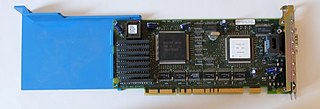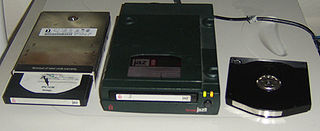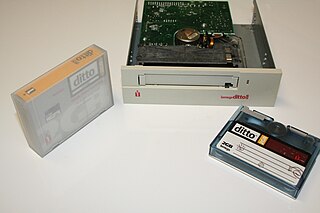
Micro Channel architecture, or the Micro Channel bus, is a proprietary 16- or 32-bit parallel computer bus introduced by IBM in 1987 which was used on PS/2 and other computers until the mid-1990s. Its name is commonly abbreviated as "MCA", although not by IBM. In IBM products, it superseded the ISA bus and was itself subsequently superseded by the PCI bus architecture.

Data acquisition is the process of sampling signals that measure real-world physical conditions and converting the resulting samples into digital numeric values that can be manipulated by a computer. Data acquisition systems, abbreviated by the acronyms DAS,DAQ, or DAU, typically convert analog waveforms into digital values for processing. The components of data acquisition systems include:

Iomega was a company that produced external, portable, and networked data storage products. Established in the 1980s in Roy, Utah, United States, Iomega sold more than 410 million digital storage drives and disks, including the Zip drive floppy disk system. Formerly a public company, it was acquired by EMC Corporation in 2008, and then by Lenovo, which rebranded the product line as LenovoEMC, until discontinuation in 2018.

The Jaz drive is a removable hard disk storage system sold by the Iomega company from 1995 to 2002.

The Ditto drive series was a proprietary magnetic tape data storage system released by Iomega during the 1990s. It was marketed as a backup device for personal computers.

Overland Storage is a wholly owned subsidiary of Sphere 3D Corp. It has acquired Tandberg Data shortly before being acquired by Sphere 3D itself. The two subsidiaries were later rebranded under the common Overland-Tandberg brand.

Irwin Magnetic Systems, Inc., also known as Irwin Magnetics, was a computer storage manufacturer founded in 1979 and based in Ann Arbor, Michigan. At its height, the company employed 600 people in Ann Arbor. The company's primary product lines were magnetic tape data storage systems, most popularly the proprietary AccuTrak format. This format was widely adopted by Compaq, Hewlett-Packard and other OEM manufacturers; it was also incorporated into IBM Personal System/2 (PS/2) personal computers as an option. In 1989, the company was acquired by Cipher Data Products for US$77 million. Cipher was in turn acquired by Archive Corporation a year later. Archive maintained Irwin as an independent brand for a while after the acquisition.
Rexon Business Machines, later Rexon, Inc., was a manufacturer of small business computer systems founded by Ben C. Wang in 1978 in Culver City, California. It also became a major manufacturer of tape drives and related products. At its height, it played a significant role in the development and sale of magnetic tape data storage products. It traded on the NASDAQ under the symbol REXN until it filed for bankruptcy in 1995 and was acquired by Legacy Storage Systems, a Canadian company. It was last headquartered in Longmont, Colorado.
Core International, Inc., commonly referred to as Core, was a multinational computer and technology corporation headquartered in Boca Raton, Florida, United States.
Tallgrass Technologies Corporation was an American computer hardware company that was the first to offer a hard disk drive product for the IBM PC in 1981. Tallgrass was a Kansas City based microcomputer hardware and software company founded in December 1980 by David M. Allen. The hard disk drive product was initially sold in Computerland stores, alongside the original IBM PC. Tallgrass added tape-backup systems to its product line in 1982.

IBM Product Center was an American retailer wholly owned by International Business Machines that sold the company's office equipment, which consisted at the time mostly of photocopiers, typewriters and personal computers. The first store opened in 1980 in downtown Philadelphia, Pennsylvania.

Reply Corporation, often shortened to Reply Corp., was an American computer company based in San Jose, California. Founded in 1988 by Steve Petracca, the company licensed the Micro Channel architecture from IBM for their own computers released in 1989, competing against IBM's PS/2 line. The company later divested from offering complete systems in favor of marketing motherboard upgrades for older PS/2s. Reply enjoyed a close relationship with IBM, owing to many of its founding employees, including Petracca, having worked for IBM. The company was acquired by Radius in 1997.

CMS Enhancements Inc. was an American computer company headquartered in Irvine, California. Founded in 1983, the company's main product lines in the 1980s were internal and external hard drives and tape drives. The company's hard drives were chiefly sourced from Seagate and reconfigured in bespoke configurations for certain computing platforms, such as the Macintosh, the IBM PC, and the Compaq Deskpro, among others.
The Micro Channel Developers Association (MCDA) was a consortium of computer manufacturers that sought to consider and prioritize steps in the maturation of the Micro Channel architecture, as well as to explore better approaches to disseminating technical information about Micro Channel to third parties.

Aox Inc. was a privately run American technology corporation founded by Michael and Linda Aronson in 1978. Over the course of its 22-year lifespan, the company chiefly developed software and hardware for IBM's PC and compatibles, for the Personal System/2, and for the Macintosh. In its twilight years, the company designed multimedia and teleconferencing devices and chip designs. Aox was founded after Michael Aronson graduated from Harvard University with a doctorate in physics; he stayed with the company until 2000, when he incorporated EndPoints Inc. and switched to full-time fabless semiconductor design.

Cumulus Corporation was an American computer peripheral and system manufacturer active from 1987 to 1993. Based in Beachwood, Ohio and started by Tecmar founder Martin Alpert, the company set out to exclusively manufacture expansion products for IBM's Personal System/2 (PS/2) family of computers—mainly RAM expansion cards. It later released cross-platform CPU upgrade cards and memory expansion cards for other platforms besides the PS/2. Beginning in 1990, the company began trading as Cumulus Computer Corporation and began releasing complete systems of their own. Initially a success story for the tech industry in Cleveland, a botched stock launch in 1992 proved disastrous for the company's ailing cash flow situation, and in 1993 the company was liquidated amid massive debt to suppliers and lenders.
Video Seven, Inc., also typeset as Video-7, later Headland Technology, Inc., was a public American computer hardware company independently active from 1984 to 1989. The company manufactured expansion cards for personal computers, mainly graphics cards for the IBM PC through their Vega brand. It was founded by Paul Jain as his second venture in the graphics card market; after his departure in 1990, he founded Media Vision. Video Seven delivered both the first graphics card compatible with IBM's Enhanced Graphics Adapter (EGA), in 1985, and one of the first cards compatible with IBM's Video Graphics Array (VGA) standard, in 1987. In 1989, Video Seven merged with G-2 Inc., a subsidiary of LSI Logic Corporation, becoming Headland Technology.
Parallan Computer, Inc., was an American computer company active from 1986 to 1999 and based in Mountain View, California. The company was best known for their line of servers and collaborations with IBM for the latter's PS/2 Server range. In 1994, the company merged with Meridian Data, Inc., assuming the latter's name and marketing CD-ROM servers before moving into the network-attached storage (NAS) market with the Snap! Server. In 1999, Quantum Corporation acquired Meridian Data for $85 million.

Colorado Memory Systems, Inc. (CMS), was an American technology company independently active from 1985 to 1992 and based in Loveland, Colorado. The company primarily manufactured tape drive systems, especially those using quarter-inch cartridges (QIC)s, for personal computers and workstations. Colorado Memory Systems was founded by Bill Beierwaltes as an offshoot of his previous company, Colorado Time Systems, also based in Loveland. It was acquired by Hewlett-Packard in 1992.
Xebec Corporation, formerly Microcomputer Systems Corporation, was an American computer hardware company active from 1969 to 1990. The company was primairly known for their data storage products, especially their hard disk controller ICs. A major customer of Xebec was IBM, who used their disk controllers extensively in the PC XT in 1983, their first PC with a hard drive preinstalled.















